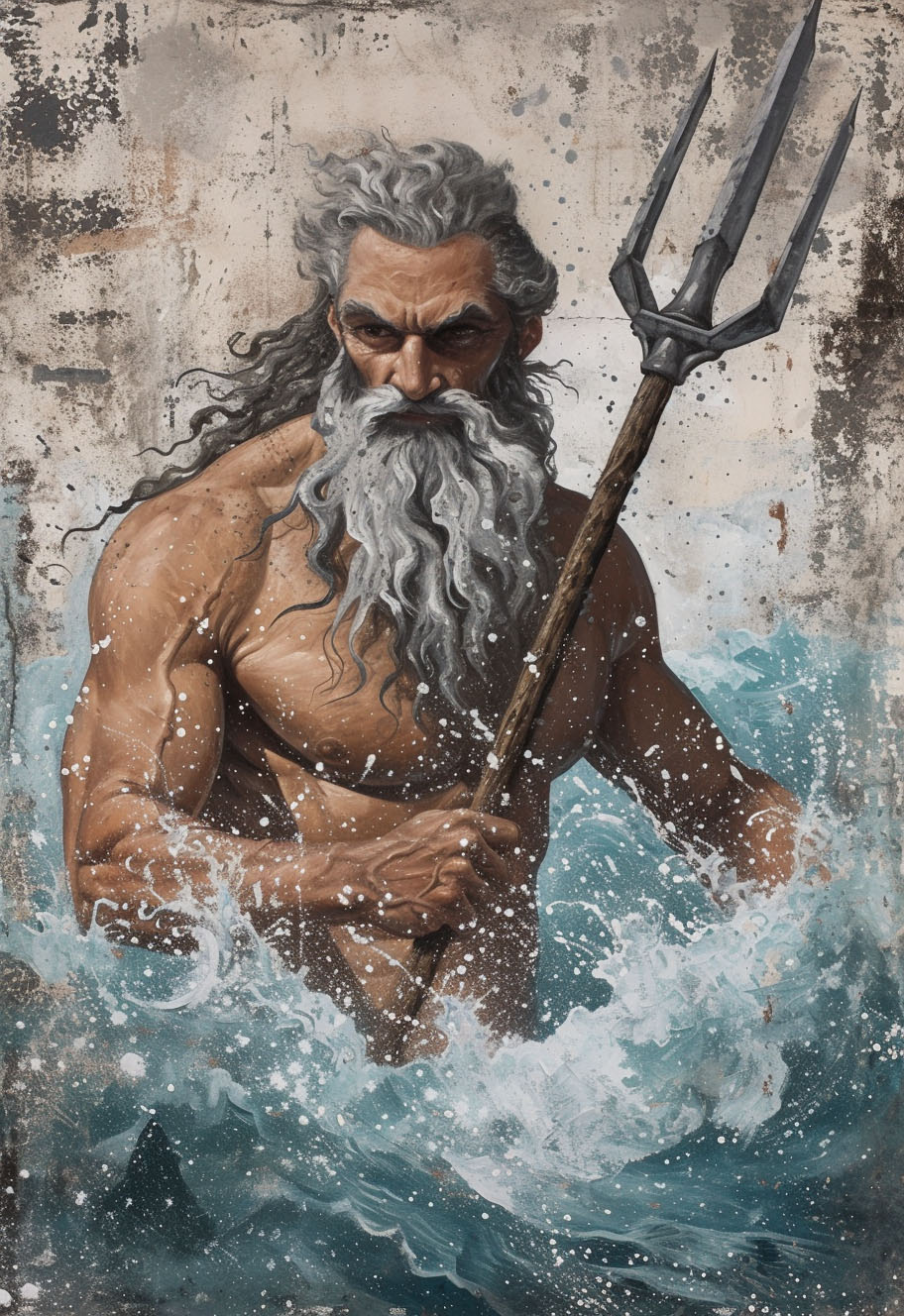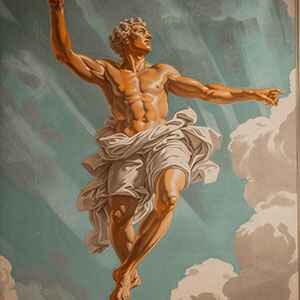Oceanus
In Greek mythology, Oceanus is a primordial deity and one of the Titans, the ancient and powerful beings that predate the Olympian gods. Oceanus is associated with the vast, world-encircling river that bears his name. Here are key aspects of Oceanus in Greek mythology:

Primordial Origin: Oceanus is born from Uranus (the sky) and Gaia (the Earth), making him a Titan. He is one of the first generation of divine beings that emerged from the primordial chaos.
Personification of the Ocean: Oceanus is primarily associated with the world ocean, which was believed to encircle the entire earth. In this aspect, he personifies the concept of the ocean and the endless flow of water.
Marital Union: Oceanus is often mentioned as the husband of Tethys, another Titaness. Together, they are the parents of the Oceanids, nymphs associated with various bodies of water.
Father of Rivers: Oceanus is considered the father of rivers and their nymphs. The rivers were thought to be branches of the great world river that flowed around the earth. The Oceanids, his daughters, were often associated with specific rivers.
Neutral Stance in the Titanomachy: During the Titanomachy, the war between the Titans and the Olympians, Oceanus remained neutral and did not participate in the conflict. As a result, he was not cast into Tartarus with the defeated Titans.
Role in the Cosmos: Oceanus and Tethys were often seen as representing the cosmic river that encircled the world. They symbolise the unending and cyclical nature of life, time, and the cosmos.
Cultural and Literary References: Oceanus is mentioned in various ancient Greek texts, including Hesiod's "Theogony." In this work, Hesiod provides a genealogy of the gods, outlining the relationships between the Titans and other divine beings.
Myth of Prometheus: In some traditions, Oceanus and Tethys are connected to the myth of Prometheus. It is said that Prometheus sought their counsel and assistance when he was punished by Zeus for stealing fire and giving it to humans.
Symbolism of the Ocean: Oceanus symbolises the ancient Greek understanding of the ocean as a divine and all-encompassing force. His personification embodies the mysterious depths and the ceaseless motion of the sea.
Later Interpretations: In later Roman culture, Oceanus continued to be associated with the concept of the world ocean. His portrayal sometimes extended beyond the Greek understanding, incorporating elements of the Roman concept of the god Oceanus.
Oceanus, as a primordial deity, represents the fundamental forces of the natural world, particularly the concept of the world ocean as a cosmic river encircling the earth. His significance lies in his role as a Titan and as a symbol of the boundless and eternal nature of the ocean.
Immediate Family
Quick Facts
- Born from Uranus and Gaea.
- Personifies the world ocean.
- Husband of Tethys, father of the Oceanids.
- Considered the father of rivers and their nymphs.
- Remained neutral in the Titanomachy.
- Represents the cosmic river encircling the world.
- Mentioned in Hesiod's "Theogony."
- Connected to the myth of Prometheus.
- Symbolizes the ancient Greek understanding of the ocean.
- Continued association with the world ocean in later Roman culture.
Further Reading
Art &
Architecture
Ancient Greek art and architecture, with its harmonious proportions and timeless elegance, continue to inspire awe and admiration millennia later.
Discover
Greek Mythology & Mythical Characters
Greek mythology, a rich tapestry of gods, heroes, and mythical creatures, captivates the imagination with its tales of love, betrayal, and epic adventures that delve into the depths of the human psyche.
Discover
Ancient Greek History
Ancient Greek history, marked by remarkable achievements in democracy, philosophy, and warfare, shaped the foundation of Western civilization, leaving an indelible legacy of innovation and cultural influence that continues to resonate to this day.
Discover
Ancient Greek Olympics
The ancient Greek Olympics, held in Olympia every four years, celebrated athleticism, unity, and cultural pride, serving as a testament to the enduring spirit of competition and excellence that transcends time and borders.
Discover
Ancient Greek Wars
Ancient Greek wars, such as the Persian Wars and the Peloponnesian War, were pivotal conflicts that shaped the course of history, highlighting the struggle for power, independence, and the clash of civilizations in the ancient Mediterranean world.
Discover
Ancient Greek Culture and Society
Ancient Greek culture and society, characterized by its emphasis on art, philosophy, and civic engagement, fostered a vibrant intellectual and social landscape where innovation flourished, democracy thrived, and the pursuit of knowledge and excellence was celebrated as fundamental values of civilized life.
Discover

